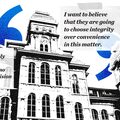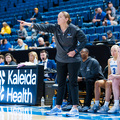Guest Essay: Despite scholarship, study abroad is still financial burden

Our essayist reflects on earning the Gilman Scholarship and notes resilience and luck shouldn’t determine who can study abroad. Universities must reduce barriers and ensure all students can access international experiences. Emma Soto | Contributing Illustrator
Get the latest Syracuse news delivered right to your inbox.
Subscribe to our newsletter here.
The question of how I didn’t have a passport became surprisingly common when I arrived at college. My answer was simple: I’d never needed one. Traveling beyond the United States was something other people did — people whose families could afford vacations overseas or whose schools offered trips to Europe.
When I decided as a freshman that I wanted to study abroad during my junior year, I knew it wouldn’t just be an academic challenge; it’d also be a financial one. For years, studying abroad has been marketed as a “once in a lifetime experience,” and while that’s true, it’s also a privilege. For low-income students in the U.S., it can feel like an unattainable dream.
This past semester, I studied abroad in London, England. The program tuition alone was around $10,000, not to mention the additional costs of paperwork, visas and travel. I didn’t own a passport, had never applied for a visa and had no idea how to purchase an international flight. I was starting from zero.
I’ll admit, I expected more support from Syracuse University itself. The university heavily advertises study abroad as part of the full college experience, but when it came time to actually make it happen, the financial resources felt thin.
Instead of finding robust institutional aid, I was left relying on external scholarships and piecing together outside funding to cover costs. The message was clear: while studying abroad was marketed as something every student could and should do, it was really an opportunity I could only access through resources beyond my university.
The only reason I made it to London was the Benjamin A. Gilman International Scholarship.
The Gilman Scholarship is a federal grant for Pell Grant-eligible students, specifically designed to open doors for students like me. Applying wasn’t easy – it required three essays and a lot of vulnerability about why I wanted to go – but it was worth it.
When I opened my online Gilman scholarship portal to see a $3,500 reward, I felt like the weight of the world had been lifted off my shoulders. Suddenly, studying abroad wasn’t just something other people got to do. It was something in reach for me, too.
The Gilman scholarship gave me breathing room – not just financially, but emotionally. It made me feel seen, like there was a system rooting for me instead of quietly keeping me out.
This scholarship allowed me the opportunity to mess up; to convert pounds to dollars wrong, to accidentally budget wrong one week and get that extra coffee before my internship the next. Knowing I wasn’t just surviving – I was learning, connecting and proving to myself that I belonged there – made the experience that much richer.
This points to a deeper problem: our study abroad system is built on resilience, not accessibility. Low-income students are expected to jump through more hoops, write more essays and prove our worthiness again and again.Nadine Walker, Guest Essayist
But here’s the tension: even with the Gilman scholarship, the financial reality of studying abroad weighed heavily.
Many students like me patch together scholarships, loans and extra work just to access the same “transformative” opportunities their wealthier peers can sign up for without a second thought. And most times, the system works against us.
When I received the Gilman scholarship, SU rescinded my work-study award for the year. It was as if the financial aid office assumed my need for income had disappeared simply because I received support for travel. In reality, my bills and responsibilities at home remained unchanged.
This points to a deeper problem: our study abroad system is built on resilience, not accessibility. Low-income students are expected to jump through more hoops, write more essays and prove our worthiness again and again.
According to a study by Mitic and Wolniak published in the Journal of Student Financial Aid, students who’ve experienced financial adversity are more likely to study abroad than those who haven’t – perhaps because they’ve developed resilience and adaptability.
Federal programs like the Gilman scholarship are vital lifelines, but they can’t erase the fact that studying abroad is still treated as an elite add-on rather than an enlightening element of higher education that every student deserves.
I don’t say this to diminish what the Gilman scholarship gave me. In fact, I want more students to know about it, apply and let it transform what they think is possible. I’m proud to be a Gilman scholarship recipient, and I know firsthand how much it can change a student’s trajectory. The program gave me confidence, community and the chance to see myself in a global context.
However, gratitude and criticism can coexist. I am grateful for the doors the Gilman scholarship opened, but I’m also frustrated those doors remain closed to so many others. If colleges truly believe in the value of global learning, they need to do more than celebrate the handful of low-income students who find ways through. They need to reduce unnecessary program markups, ensure aid packages don’t penalize students who win scholarships and make study abroad a core, equitable part of the undergraduate experience.
Until then, the reality is that studying abroad will remain a symbol of inequity in higher education. It’s an unforgettable experience – just not for the right reasons. For some students, the journey is defined as much by the financial gymnastics it took to get there as by the cultural immersion itself. For others, the opportunity never comes at all.
The Gilman scholarship turned a distant dream into my reality, and I encourage other students to look into it, even if it feels out of reach. But I can’t ignore the truth: I shouldn’t have had to be this resourceful, or this lucky, just to access an experience my university flaunts as an easily-accessible experience. Studying abroad may be “life-changing,” but until we address who is excluded, we must be honest about whose lives are actually being changed.
Nadine Walker is a senior advertising major. She can be reached at nwalke06@syr.edu.






